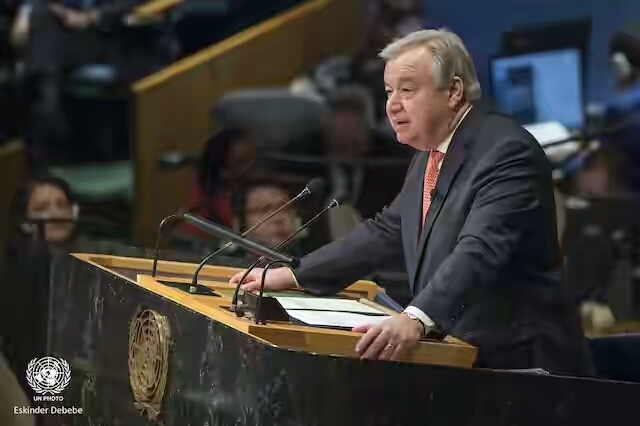At least 21 million people are victims of human trafficking, the UN Secretary-General António Guterres said on Wednesday, adding that the traffickers are smiling to the bank with $150billion every year.
Guterres described the human trafficking trade as appalling.
Guterres, who made the remarks at the ‘Ministerial Open Debate on Trafficking in Persons in Conflict Situations: Forced labour, slavery and other similar practices’ organised by the Security Council, condemned the rising cases of human trafficking.
The UN scribe estimated that traffickers made $150 billion annually through different forms of human trafficking and called for strong efforts to stop the evil trade.
“The International Labour Organisation reports that 21 million people around the world are victims of forced labour and extreme exploitation. Annual profits are estimated to be 150 billion dollars.
“Beyond these numbers is the human toll – the lives cut short, the families and societies torn apart, the gross violations of human rights and international humanitarian law,” Guterres lamented.
The UN chief explained that human trafficking took many forms, pointing out that “women and girls in particular are targeted again and again and again”.
“We see brutal sexual exploitation, including forced prostitution, forced marriage and sexual slavery. We see the appalling trade in human organs.
“Let us also remember that modern manifestations of servitude may touch and even implicate us all. Global supply-chains have transformed many lives for the better – but not always without costs.
“In some situations – clothes, food, smartphones, jewellery and other consumer goods may bear, wittingly or unwittingly, the traces of exploitation.
“Gleaming new skyscrapers may owe some of their shine to the sweat of bonded labourers,” he said.
According to him, human trafficking thrives where the rule of law is weak or nonexistent, while situations of armed conflict are especially virulent breeding grounds for human trafficking.
“In some of today’s conflicts, we are confronted by armed groups that not only openly engage in enslavement and forced labour, but actually argue that it is legal.
“In Syria, Daesh has organized slave markets and even published manuals instructing its fighters on how to capture, control and trade enslaved women and girls.
“The leaders of Boko Haram have also argued that slavery is legal.
“In other conflicts, other groups force men, women and children under their control to labour in unsafe mines, as porters and domestic servants, and on the frontlines.”
Guterres said smugglers often coerced and manipulated individuals for profit and make them victims of sex or labour trafficking while terrorists and violent extremists used sexual enslavement as a tool for recruitment.
Drug traffickers use kidnapping and ransom to finance their operations. Criminal gangs force unaccompanied children into a life of petty crime, he added.
He, however, noted UNODC’s December 2016 Global Report on Trafficking in Persons, that there are hardly any convictions for crimes related to human trafficking in conflict situations or elsewhere.
Guterres warned that the lack of aggressive investigations and prosecutions only adds to the injustice, allows perpetrators to function without fear, fuels corruption and creates widespread disillusion.
“There is much that we can do both to punish human trafficking, and to prevent it in the first place.
“A solid legal and normative framework is in place, including the UN Convention against Transnational Organized Crime and its Protocol.
“This includes the first internationally agreed definition of the crime of trafficking in persons and provides a framework to effectively prevent and combat it.
“ILO Conventions and the Global Plan of Action on Human Trafficking complement the Protocol, and are further key parts of the picture.
“All of these build on the Universal Declaration of Human Rights. Under the Rome Statute, enslavement can constitute a crime against humanity,” the UN scribe said. (NAN)




 Premier League
Premier League